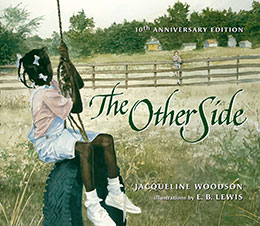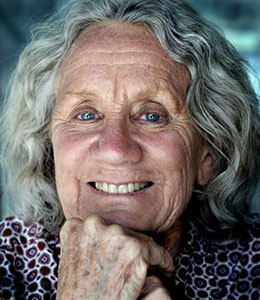Caren: When my daughter Beth was fourteen, she traveled with a small exchange group of teens to Poland where she would live with a couple and their teen daughter in a small village. In a true exchange, the Polish teens then traveled to Minnesota for a similar experience. Neither group spoke the other’s language. Recently, while cleaning out boxes, I found a reflection Beth wrote of that experience:
The Polish kids taught me one of the most valuable lessons I have ever learned; the power of a smile … I thought that to create the iron strong bonds of friendship, a common language was essential. Now I have learned, communication and language are not the same thing.
Beth is an adult now, yet through all the years, she and her Polish “sister” Ania have remained friends. Border crossing can make an indelible mark on a young person’s life and give her the courage and skills to widen her world.

You don’t have to travel to another country to cross borders. You can cross borders by crossing the street, stepping into another’s neighborhood, or sitting next to someone new. What you pack in your traveling suitcase is as simple as a smile. An open heart. A listening ear. A realization that to meet a new person is to explore a new world.
The Other Side by Jacqueline Woodson
 Jacqueline Woodson’s beautiful picture book, The Other Side, illustrated by E. B. Lewis, is an example of border crossing. The story depicts a small, segregated town where black families and white are separated by a physical border — a fence. Clover plays with her African American friends on one side. Annie, with wavy red hair, lonely and wanting to play, watches from the other side. When Clover’s mother reminds her daughter to stay on her side of the fence, Clover asks why. “That’s the way things have always been,” her mother replies. The warning doesn’t keep Clover and Annie from reaching out to each other. No one says the girls can’t sit on the fence. And when they sit next to each other on the top fence rail, they see the big wide world and each other. Eventually the girls on both sides of the fence play together, knowing someday someone will “knock this ol’ fence down.”
Jacqueline Woodson’s beautiful picture book, The Other Side, illustrated by E. B. Lewis, is an example of border crossing. The story depicts a small, segregated town where black families and white are separated by a physical border — a fence. Clover plays with her African American friends on one side. Annie, with wavy red hair, lonely and wanting to play, watches from the other side. When Clover’s mother reminds her daughter to stay on her side of the fence, Clover asks why. “That’s the way things have always been,” her mother replies. The warning doesn’t keep Clover and Annie from reaching out to each other. No one says the girls can’t sit on the fence. And when they sit next to each other on the top fence rail, they see the big wide world and each other. Eventually the girls on both sides of the fence play together, knowing someday someone will “knock this ol’ fence down.”
Compassionate, Deep Listening for Adults, Too
My father used to remind me, “You have two ears and one mouth. Use them in that proportion.”
Good advice. A more profound quote is a Quaker saying: “An enemy is a person whose story we have not heard.” For me, crossing borders means to learn to listen carefully, deeply, and compassionately to someone’s story without thinking about what I may want to say in response. If we can look into each other’s eyes and listen to each other’s stories, something breaks open in our hearts. Physically, in our bodies, we can feel barriers breaking down and empathy and understanding rise up.

In the list of TED talks about deep listening, the one that moved me the most was Judy Atkinson’s insightful talk about “The value of deep listening, the aboriginal gift to the nation.”
Dr. Atkinson is an Aboriginal scholar who speaks to the social trauma in her own country of Australia and the power of listening to understand and heal. Dr. Atkinson’s talk asks us to cross borders to the other side of the world. What we find in her story could well happen across our own streets, in a nearby neighborhood, with someone sitting next to us. In any culture and language, deep listening is a universal tool to connect.
Deep Listening Practice for Everyone
How can we help our children (and ourselves) become border crossers? Start with practicing deep listening. Educator and writer Diana Raab had a list of tips in her article published in Psychology Today: “Deep Listening in Personal Relationships.”
- Put yourself inside the mind of the speaker.
- Listen for meaning.
- Pay attention to body language.
- Cultivate empathy.
- Avoid making judgments.
- Look into others’ eyes when they’re speaking.
- Pay attention to the feelings associated with the words.
- Notice the speaker’s tone and inflection.
- Repeat in your own words what someone has told you.
- Acknowledge that you’re listening by nodding or saying “Uh-huh.”
- Occasionally summarize others’ comments when given the chance.
“By listening carefully when someone speaks, we’re telling them that we care about what they’re saying. It’s also important to remember that listening is contagious. When we listen to others, then chances are they will be more inclined to listen to us.” writes Raab with more good advice.
No matter how young or old, if we practice deep, compassionate listening, we’ll find the courage to cross borders into one another’s world. As in the picture book, The Other Side, we might even watch those ol’ fences come tumbling down.
_________________________
For each Peace-ology post, Caren and Ellie partner to learn and explore the meaning of peace by talking and listening with each other. If you’d like to share your ideas about peace, books, and children, please share your comments here, or visit our websites.

Thank you for this post. I love what you said about “crossing borders,” and how that can happen by simply listening. I will take this essay to heart and put it into practice.
One of my favorite books. So easy to share in adult writing classes. Woodson does a perfect job of showing, rather than telling.
And, as David said above, your writing affected me deeply. I will remember that all I need to communicate in a foreign land is a smile.